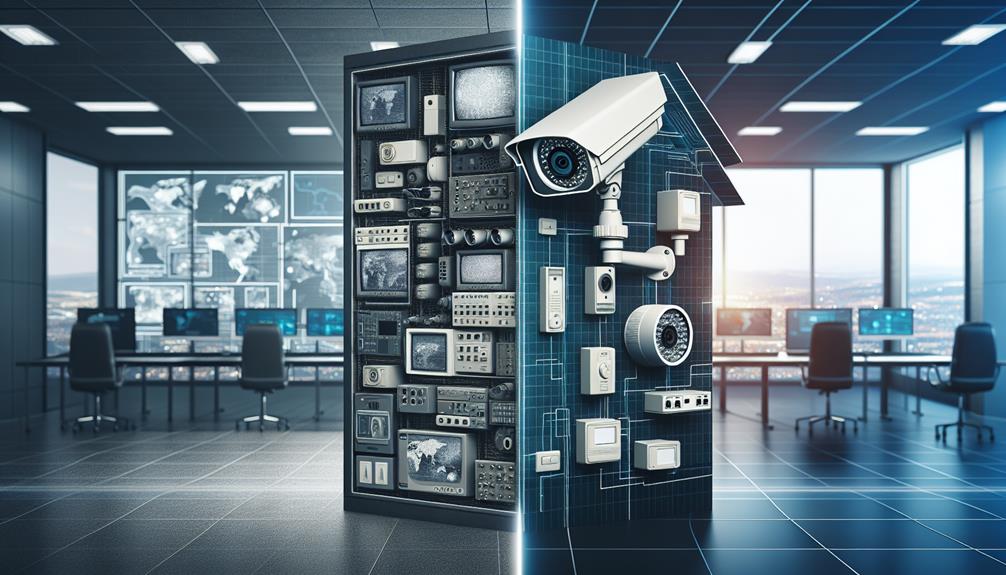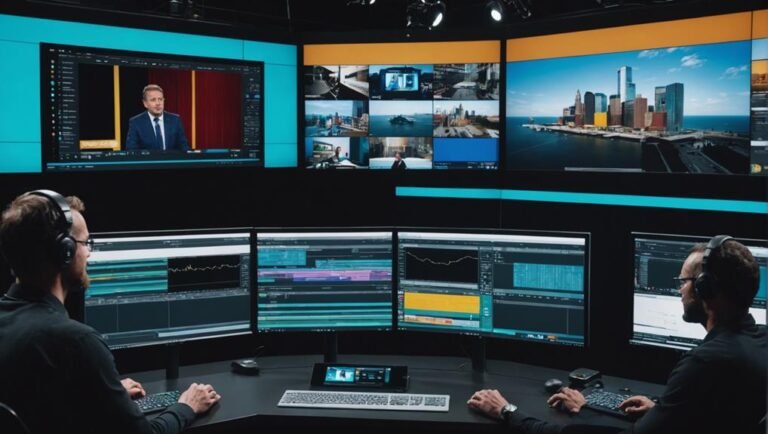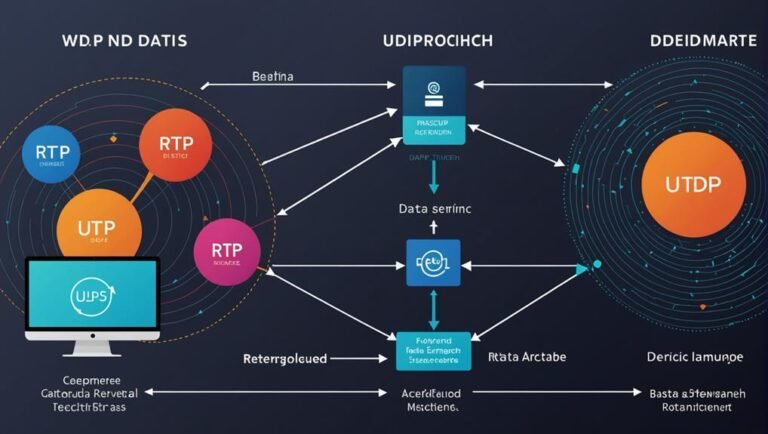When comparing CCTV cameras to IP cameras, you’ll find that CCTV cameras are analog and use coaxial cables, limiting their resolution and scalability. IP cameras, on the other hand, are digital, offering high-resolution video and flexible installation via Wi-Fi or Ethernet. They’re packed with advanced features like video analytics and motion detection. While CCTV cameras might be cheaper upfront, IP cameras provide better long-term value and security with encryption and remote access. If you want to truly understand what sets them apart and make the best choice for your needs, you’ll want to explore further.
Technology Difference
Understanding the technological differences between CCTV and IP cameras is essential for making an informed choice. CCTV cameras, or Closed-Circuit Television, transmit video signals to a limited set of monitors using coaxial cables. They are analog, meaning they capture and transmit footage in a straightforward, traditional way. You might appreciate their simplicity and reliability, but they do come with limitations regarding resolution and scalability.
In contrast, IP cameras, or Internet Protocol cameras, are digital and transmit data over a network. They provide higher resolution images and more flexibility when it comes to installation and integration with other systems. With IP cameras, you can access footage remotely via the internet, offering a level of freedom and convenience that CCTV systems can’t match. You’ll also find advanced features like video analytics and motion detection, which enhance security and efficiency.
Choosing between the two ultimately depends on your specific needs and how much freedom you want. If you prioritize high-quality images and remote accessibility, IP cameras are likely the better choice. However, if you need a simple, reliable system without the complexities of network configurations, CCTV cameras might suit you better.
Diffeerence on Installation Process
Installing CCTV and IP cameras involves distinct steps and considerations that can affect the overall security system’s efficiency. If you’re leaning towards traditional CCTV, the installation is relatively straightforward but requires more wiring. You’ll need to connect each camera to a central DVR using coaxial cables, which means running wires through walls or ceilings. It’s a bit of a hassle but offers reliable, continuous video feeds.
On the other hand, IP cameras give you more freedom. They connect to a network via Wi-Fi or Ethernet, making the installation process simpler and more flexible. You won’t need extensive wiring, which is a huge plus if you value a clean setup. Just plug them into your network and configure them using software on your computer or smartphone.
You should also consider power sources. CCTV cameras usually need a separate power supply, while many IP cameras can use Power over Ethernet (PoE), reducing the number of cables. Setting up an IP camera system might seem more complicated initially, but its flexibility and ease of adding additional cameras later make it a worthy consideration for those who value freedom and scalability in their security setup.
Video Quality Facts
While installation is an important factor, you’ll also want to take into account the video quality differences between CCTV and IP cameras. Video quality can make or break your surveillance system, especially if you’re keen on capturing clear, detailed footage. Let’s break down the key differences:
- Resolution: CCTV cameras typically offer standard-definition (SD) footage, which may suffice for basic monitoring. However, IP cameras often provide high-definition (HD) and even ultra-high-definition (UHD) video, giving you crystal-clear images. This can be critical if you need to identify faces or read license plates.
- Field of View: IP cameras usually come with a wider field of view compared to their CCTV counterparts. This means you can cover more ground with fewer cameras, offering greater flexibility and freedom in how you monitor your space.
- Night Vision: Both CCTV and IP cameras can offer night vision, but IP cameras often excel with advanced features like infrared (IR) capabilities and better low-light performance. This guarantees you get quality footage even in the darkest conditions.
Choosing between CCTV and IP cameras for video quality boils down to your specific needs. If you value clear, detailed footage and greater flexibility, IP cameras might be the way to go.
Cost Comparison
When it comes to cost, CCTV cameras generally have a lower upfront price compared to IP cameras. If you’re budget-conscious, this lower initial investment can be quite appealing. Traditional CCTV systems are usually simpler and cheaper to buy and install. The cameras themselves are less expensive, and the analog technology they use has been around for decades, making it more affordable.
However, don’t let the initial savings blind you. IP cameras, while pricier upfront, offer more regarding long-term value. They often come with advanced features like high-resolution video, remote access, and easier scalability. These features can save you money down the line by reducing the need for additional equipment and maintenance. Plus, the higher resolution of IP cameras means you may need fewer cameras to cover the same area, balancing out the initial cost difference.
It’s also worth considering installation costs. CCTV systems can be more labor-intensive to install due to the extensive cabling required. On the other hand, IP cameras can often be set up with fewer cables, especially if you’re using wireless options. So, while CCTV may seem cheaper initially, IP cameras could offer a better return on investment over time.
Security Features
IP cameras offer advanced security features that can greatly enhance your surveillance capabilities. Unlike traditional CCTV cameras, IP cameras are designed to provide higher levels of security and flexibility. They’re packed with smart features that cater to your need for freedom and control over your environment.
Here are three key security features of IP cameras that stand out:
- Encryption: IP cameras use encryption protocols to protect the data they transmit. This means your video feed is secure from unauthorized access and potential cyber threats.
- Remote Access: You can monitor your IP cameras from anywhere in the world via internet-connected devices. This remote access empowers you to keep an eye on your property without being physically present, giving you the freedom to move around.
- Advanced Motion Detection: IP cameras come with advanced motion detection capabilities. They can differentiate between regular movement and suspicious activities, reducing false alarms and ensuring that you’re alerted only when necessary.
Choosing IP cameras for your security needs means opting for a system that offers more than just video recording. It’s about embracing a technology that supports your lifestyle, giving you peace of mind and the liberty to live life on your terms.
Frequently Asked Questions
How Do IP Cameras Handle Network Bandwidth Issues?
Imagine a smooth river flow. IP cameras manage network bandwidth by compressing video streams and adjusting quality based on available bandwidth. They guarantee you won’t experience lag, giving you the freedom to monitor seamlessly.
Can CCTV Cameras Be Integrated With Smart Home Systems?
Yes, you can integrate CCTV cameras with smart home systems. Just make sure they’re compatible with your existing setup. Once connected, you’ll enjoy seamless monitoring and control, giving you that extra layer of security and freedom.
What Are the Data Storage Options for IP Cameras?
Imagine you’re setting up your smart home. IP cameras offer flexible data storage options, like cloud services and local storage on SD cards or network-attached storage (NAS). You choose what fits your lifestyle and needs.
Do CCTV Cameras Work During Power Outages?
You might wonder if your cameras work during power outages. Unfortunately, they don’t unless you’ve got a backup power source like a UPS or a generator. Ensuring constant surveillance requires some preparation and planning.
How Does Weather Affect the Performance of Both Camera Types?
Imagine your cameras as vigilant sentinels. Rain, snow, and extreme temperatures can challenge their performance. Weatherproof housings help, but it’s wise to check specs and install them in sheltered locations to guarantee freedom from interruptions.



